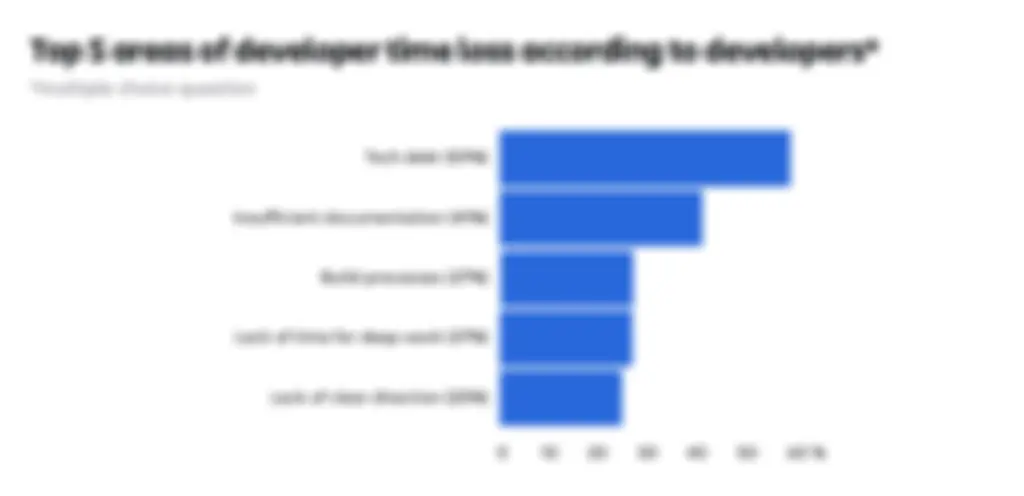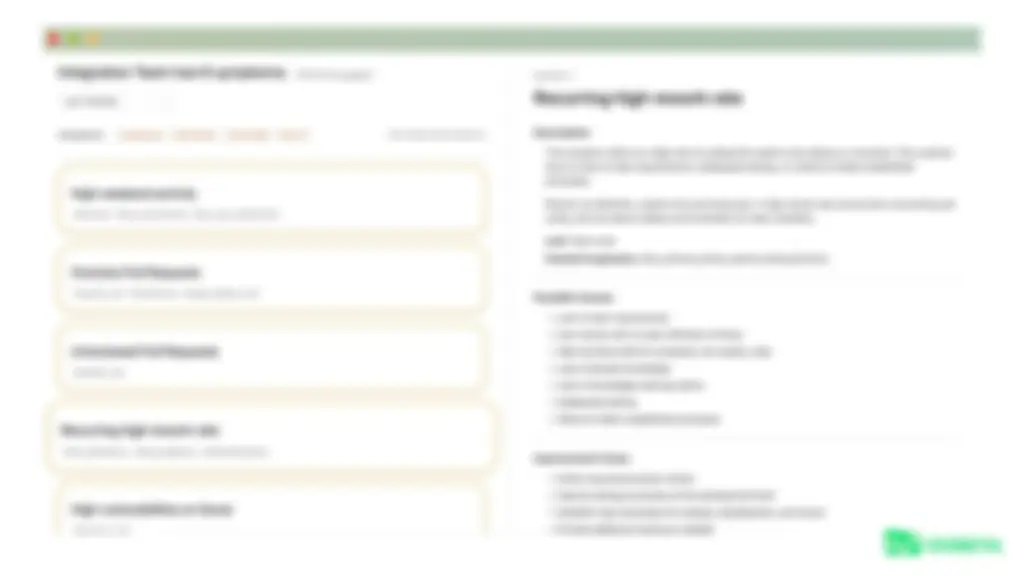Table of Contents
- Introduction
- The Disconnect Between Developers and Leaders
- The Importance of Developer Experience
- Leveraging AI for Better Developer Experience
- Top 5 Inefficiencies According To Developers
- Technical Debt
- Insufficient Documentation
- Build Processes
- Lack of Time for Deep Work
- Lack of Clear Direction
- State of Developer Experience 2024 Key Findings
- How Oobeya Can Help Improve Developer Experience
- Oobeya’s Team Symptoms Related To Developer Experience
- How to Measure Developer Experience
- Conclusion
Introduction
In the dynamic world of software development, ensuring a seamless developer experience is more crucial than ever. Recent research "State of developer experience report 2024" by Atlassian, in collaboration with DX and Wakefield Research, sheds light on the current state of developer experience and offers actionable insights for improvement. This blog post explores the key findings and how Oobeya can help organizations enhance their developer experience.
The Disconnect Between Developers and Leaders
The report highlights a significant gap between developers and their leaders. While 69% of developers lose 8+ hours weekly to inefficiencies, less than half believe their leaders are aware of these issues. This disconnect often leads to misaligned priorities and ineffective solutions.
Key Stats:
- 69% of developers lose 8+ hours weekly to inefficiencies.
- Only 44% believe their leaders are aware of these issues.
- 48% of leaders believe their dev team is understaffed.
The Importance of Developer Experience
A positive developer experience is essential for productivity and retention. However, traditional productivity metrics often fall short. Atlassian's research found that improving developer experience directly correlates with higher satisfaction and reduced time lost to inefficiencies.
Key Stats:
- 63% of developers consider developer experience important when deciding to stay in a job.
- 76% of organizations plan to invest more in improving developer experience.
Leveraging AI for Better Developer Experience
Leaders see AI as a key driver for enhancing productivity and satisfaction. However, developers remain skeptical, with many not experiencing significant gains from AI tools yet. Effective implementation requires understanding specific developer needs and creating tailored solutions.
Key Insights:
- 62% of developers say that AI tools are not improving or slightly improving their productivity today.
- The same number of developers believe this will change in the next two years.
Top 5 Inefficiencies According To Developers
Based on Stack Overflow’s 2023 Developer Survey, the global average salary for developers in 2023 was $69,767. If a developer loses an average of 8 hours per week due to inefficiencies, this translates to an annual cost of $13,954.40 per engineer. As organizations grow, the financial impact of these inefficiencies increases. Therefore, engineering leaders must identify their organization's inefficiencies and take action to eliminate them.
 State of Developer Experience Report 2024, Atlassian DX
State of Developer Experience Report 2024, Atlassian DX
1. Technical Debt (59%)
Technical debt is the most significant inefficiency affecting developers. It refers to the future work required to fix or improve code that was rushed or poorly designed. High technical debt leads to increased bugs, slower feature development, and higher maintenance costs.
2. Insufficient Documentation (41%)
Developers often struggle with inadequate documentation. When documentation is lacking or outdated, it hinders the onboarding process, slows down development, and increases dependency on more experienced team members.
3. Build Processes (27%)
Inefficient processes are another major bottleneck. This includes cumbersome workflows, redundant tasks, and a lack of automation. Streamlining processes and reducing unnecessary steps can significantly enhance productivity.
4. Lack of Time for Deep Work (27%)
Developers need large blocks of uninterrupted time to focus on complex problem-solving and coding tasks. Frequent interruptions and meetings disrupt this deep work, leading to decreased productivity and increased frustration.
5. Lack of Clear Direction (25%)
Unclear or constantly changing goals and priorities can cause significant delays and frustrations. Ensuring clear communication of project goals and regular updates can mitigate this issue.
State of Developer Experience 2024 Key Findings
- 86% of leaders believe attracting and retaining the best developer talent will be almost impossible without improving developer experience.
- 63% of developers consider developer experience important or very important when deciding to stay in their current job.
- Less than 50% of developers think their organization prioritizes developer experience.
- 2 out of 3 developers aren’t seeing significant productivity gains from using AI tools yet.
- 69% of developers lose 8 hours or more of their working week to inefficiencies.
- Only 44% of developers believe leaders are aware of these issues.
How Oobeya Can Help Improve Developer Experience
Oobeya stands out with its innovative approach to detecting and addressing development and delivery symptoms automatically. By leveraging key engineering metrics (like DORA metrics, Agile metrics, cycle time, and quality metrics) and hundreds of data points, Oobeya enables software organizations to effortlessly identify recurring anti-patterns, bottlenecks, and roadblocks.
With actionable insights derived from in-depth metric analysis, Oobeya empowers teams to take proactive steps toward optimizing their processes and cultivating healthy, effective teams.
Oobeya’s Team Symptoms Related To Developer Experience
 Oobeya Engineering Insights - State of Developer Experience
Oobeya Engineering Insights - State of Developer Experience
Recurring High Cognitive Load (S2) Developers overwhelmed by complex tasks can experience stress and reduced productivity. High cognitive load often results from poor documentation, complex codebases, or inadequate tooling.
High Weekend Activity (S3) Excessive weekend work can lead to burnout and decreased job satisfaction, often due to unrealistic deadlines or poor project management.
High Code Review Time (S4) Extended code review periods can frustrate developers, delay progress, and reduce efficiency, typically due to a lack of reviewer availability or inefficient processes.
Unreviewed Pull Requests (S9) When pull requests are left without review for too long, it causes bottlenecks and frustration among developers eager to integrate their changes.
Lightning Pull Requests (S10) Extremely fast pull request reviews may indicate superficial reviews, potentially compromising code quality and leading to technical debt.
Oversize Pull Requests (S11) Large pull requests are time-consuming to review, leading to prolonged feedback cycles and increased cognitive load on developers.
To learn more, visit Oobeya’s Symptoms Catalog.
How to Measure Developer Experience
Is it possible to measure developer experience? Absolutely. However, the key is not to overcomplicate it. Focusing too much on the problem can obscure the solution. You need to look beyond the problem. For Oobeya's partners, assessing developer experience (DX) is straightforward:
If Oobeya detects symptoms, your developer experience isn't optimal. Addressing these symptoms is crucial to improving your team's developer experience.
In essence, Oobeya helps you look beyond the problem to identify the solution.
Conclusion
Improving developer experience is an ongoing journey that requires continuous effort and alignment between developers and their leaders. By leveraging insights from Atlassian’s research and integrating Oobeya’s powerful tools, organizations can create a more satisfying and productive environment for their developers.
For more detailed insights, read the full Atlassian Developer Experience Report 2024.

